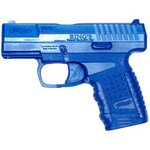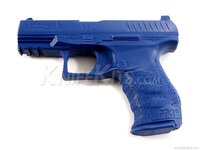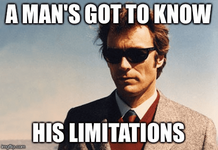Greetings,
So I have several handguns and a shotgun at home. I've never felt the need to have a gun in my home for sd, but since I now own them, it would be silly for me to not have access to them if/when needed. We have no kids and they're locked up. But, I've been in the habit of carrying my Walther Q4, in a Safepacker holster/bag when sitting at the table, tv or on the computer etc...Not around others. I want to get used to having "gun consciousness" and familiarity with the forearm. Perhaps prepare for concealed carry later. I do like to unload it, pull it out and do some dry firing and generally love the feel of the steel frame in my hands. Am I asking for trouble? Should I just leave it alone in the safe?
I also realize that in almost every direction from my house (cul de sac) and back yard, there are very few lines of sight that do not intersect with a neighbor ( I have a light/laser). Is it common practice for gun owners to actively determine when and where in your house you could fire your gun in sd without killing unintended target? I was shocked to hear of a friend who is a lifelong gun owner who kept a handgun in the BR with both of his kids rooms directly down the hall from the bedroom door. He said he finally figured that out and decided on a shotgun or something. What do people in condos and apartments do to mitigate tragedy?
Do people keep quick access safes or holster ready to go around house? Just looking for ideas and advice. Thanks in advance.
So I have several handguns and a shotgun at home. I've never felt the need to have a gun in my home for sd, but since I now own them, it would be silly for me to not have access to them if/when needed. We have no kids and they're locked up. But, I've been in the habit of carrying my Walther Q4, in a Safepacker holster/bag when sitting at the table, tv or on the computer etc...Not around others. I want to get used to having "gun consciousness" and familiarity with the forearm. Perhaps prepare for concealed carry later. I do like to unload it, pull it out and do some dry firing and generally love the feel of the steel frame in my hands. Am I asking for trouble? Should I just leave it alone in the safe?
I also realize that in almost every direction from my house (cul de sac) and back yard, there are very few lines of sight that do not intersect with a neighbor ( I have a light/laser). Is it common practice for gun owners to actively determine when and where in your house you could fire your gun in sd without killing unintended target? I was shocked to hear of a friend who is a lifelong gun owner who kept a handgun in the BR with both of his kids rooms directly down the hall from the bedroom door. He said he finally figured that out and decided on a shotgun or something. What do people in condos and apartments do to mitigate tragedy?
Do people keep quick access safes or holster ready to go around house? Just looking for ideas and advice. Thanks in advance.















